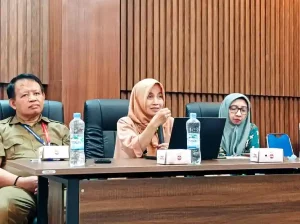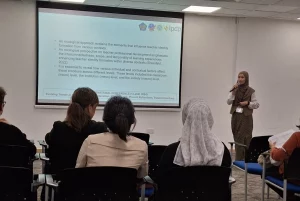UNAIR NEWS – Recently conversations about refugees have been trending. Even though it admits that it has not ratified the refugee convention, refugees in Indonesia have reached millions of people. It was conveyed by Prof Koesrianti SH LLM PhD, a professor at the Faculty of Law UNAIR in a colloquium on Saturday, Dec 2, 2023, entitled “Comparative Method of Law: Problems and Prospects”. The discussion was held in the Pancasila Hall, Faculty of Law, Universitas Airlangga.
Legal experts in Indonesia attended the discussion, such as Prof. Topo Santoso SH MH (a professor at the University of Indonesia) who discussed restorative justice or legal settlement by restoring the parties’ rights (for example, the perpetrator is rehabilitated and the victim is given compensation), and Prof. Susi Dwi Harijanti SH LLM PhD (a professor at Padjadjaran University) also spoke about public participation in law formation by learning from South Africa.
The final speaker was a lecturer at Sultan Agung Islamic University, Dr H Jawade Hafidz SH MH who presented comparative dispute resolution derived from state institutions in Indonesia, America, Germany, and Canada.
“Currently the number of refugees worldwide is 100 million, that’s after the Ukrainian crisis. In Indonesia alone, there are 13 million refugees as of 2021. Most recently, there are 712 Myanmar refugees in Aceh,” explained Prof. Koesrianti.
Discusses types of refugees and how to handle them
Prof Koesrianti explained that there are five terms to categorize refugees: refugees, IDP or internally displaced people, legal and illegal migrants, asylum seekers, and migrant workers.
“Each of these terms has its own legal status, they are not all refugees who have rights as refugees,” she added.
Handling refugees is divided into three ways, reintegration or adjustment/merging of refugees with the country’s original community. Then there is repatriation or return to the country of origin.
“Then there is resettlement, sent to the refugee destination country. Where are they going?” she said.

Refugee stigmas in ASEAN Countries
Singapore rejects the presence of refugees in its country, Singapore focuses more on its economy. Meanwhile, Thailand considers refugees to be criminals. “Indeed, many are like that, it also happens a lot in Indonesia,” said Prof Koesrianti.
Malaysia believes that refugees will cause ethnic divisions. Meanwhile, three other countries, such as Cambodia, the Philippines, and Timor Leste, ratified the refugee status convention. These ratifying countries have greater legal obligations regarding refugees. “There must be integration between refugees and their communities, such as in the national system, national politics, given equal rights, citizenship, educational rights, and so on,” she explained.
Indonesia is not a ratifying country, so there is no obligation for Indonesia to implement the result of the convention. However, the number of refugees reaching 13 million indicates that in practice, Indonesia is the same as the ratifying countries. However, Indonesia does not recognize this for several reasons.
“One, the reason for not ratifying it is because of the lack of clarity regarding when to evacuate. Second, in Malaysia, for example, ratifying means giving better obligations to refugees than to its community. Because the convention regulates their standards,” she concluded.

Other issues discussed
In addition to scientific discussions, the colloquium also presented written articles by participants on six themes in the form of comparative criminal law, comparative civil law and economics, comparative constitutional law and state administration, comparative international law, comparative legal methods, and the latest developments in constitutional, civil, criminal and administrative law.
There was also an ADPHI congress (Association of Indonesian Comparative Law Lecturers) which discussed the election of the association’s chairman for the second year. Elected as chairman of ADPHI was Prof Koesrianti SH LLM PhD as a professor at the Faculty of Law, Universitas Airlangga.
Author: Muhammad Naqsya Riwansia
Editor: Feri Fenoria









